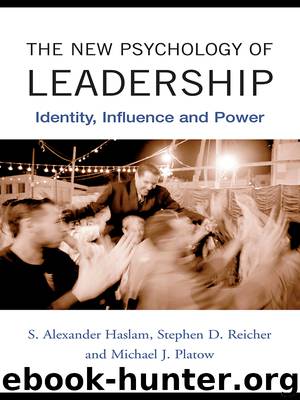The New Psychology of Leadership by Platow Michael J. Reicher Stephen D. Haslam S. Alexander & Stephen D. Reicher & Michael J. Platow

Author:Platow, Michael J., Reicher, Stephen D., Haslam, S. Alexander & Stephen D. Reicher & Michael J. Platow
Language: eng
Format: epub
Tags: Behavioral Sciences
Publisher: Taylor and Francis
Published: 2010-09-09T16:00:00+00:00
This simple communication served as the influence attempt. If participants simply conformed to the experimenter’s opinion because of his or her authority, then we would expect all participants subsequently to agree with the experimenter, and rate paintings labeled as “Kandinsky” more positively than those labelled as “Klee.” But this is not what happened. Instead, for those participants who saw the experimenter as a fellow in-group member, that experimenter’s prior fair and unfair behaviors consistently affected the participants’ subsequent ratings of paintings labeled “Kandinsky” and “Klee.” Participants preferred Kandinsky to Klee when the experimenter had been fair within the in-group; but they preferred Klee to Kandinsky when he or she had been unfair within the in-group. Importantly, though, this pattern of influence was completely reversed when the experimenter had made intergroup distributions. Here the participants preferred Kandinsky to Klee when he or she had been unfair and in-group favoring in the intergroup context. On the other hand, they preferred Klee to Kandinsky when the experimenter had been fair between the groups.
In both these studies, then, the leader was only capable of exerting positive influence over followers when he or she had a history of championing the group interest, either by being equally fair to in-group members, or by favoring in-group members over out-group members. In short, we now see that leaders’ capacity to exert influence—the very essence of leadership—rests on their behavior being seen to have “done it for us.”
In an effort to take these ideas still further, we conducted a further experiment that built on the one described above by Haslam and Platow (2001). As in the first study, student participants were told about the behavior of a student leader (again, “Chris”) who had been in a position to reward normative and anti-normative student councilors. Here, though, they were also told that Chris had come up with a new plan to lobby the university to erect permanent billboard sites on campus (you may recall that Platow and colleagues made reference to the same plan in one of the studies that we described in the previous chapter; Platow et al., 2006, Experiment 1). The study examined the support for Chris’s reward policy as well as support for this new initiative. However, on top of this, participants were also asked to write down what they thought about Chris’s decision to push for permanent billboard sites by making open-ended comments and suggestions about the proposal. Independent coders then looked at the suggestions and counted the number of these that discussed positive features of the proposal and that attempted to justify it in some way, as well as those that were critical of the proposal and that attempted to undermine it.
As in the earlier study, participants were more supportive of a policy that was fair or one that rewarded normative in-group members than they were of one that rewarded anti-normative ones. However, beyond this, their support for the leader’s new billboard campaign was also affected by the history of this behavior. More specifically, it
Download
This site does not store any files on its server. We only index and link to content provided by other sites. Please contact the content providers to delete copyright contents if any and email us, we'll remove relevant links or contents immediately.
Rewire Your Anxious Brain by Catherine M. Pittman(17581)
Talking to Strangers by Malcolm Gladwell(11861)
The Art of Thinking Clearly by Rolf Dobelli(8836)
Mindhunter: Inside the FBI's Elite Serial Crime Unit by John E. Douglas & Mark Olshaker(7828)
Becoming Supernatural by Dr. Joe Dispenza(7099)
Change Your Questions, Change Your Life by Marilee Adams(6637)
Nudge - Improving Decisions about Health, Wealth, and Happiness by Thaler Sunstein(6629)
The Road Less Traveled by M. Scott Peck(6627)
The Lost Art of Listening by Michael P. Nichols(6462)
Enlightenment Now: The Case for Reason, Science, Humanism, and Progress by Steven Pinker(6403)
Win Bigly by Scott Adams(6306)
Mastermind: How to Think Like Sherlock Holmes by Maria Konnikova(6225)
The Way of Zen by Alan W. Watts(5790)
Daring Greatly by Brene Brown(5636)
Grit by Angela Duckworth(4728)
Big Magic: Creative Living Beyond Fear by Elizabeth Gilbert(4718)
Men In Love by Nancy Friday(4315)
Flow by Mihaly Csikszentmihalyi(4047)
The Four Tendencies by Gretchen Rubin(4018)
